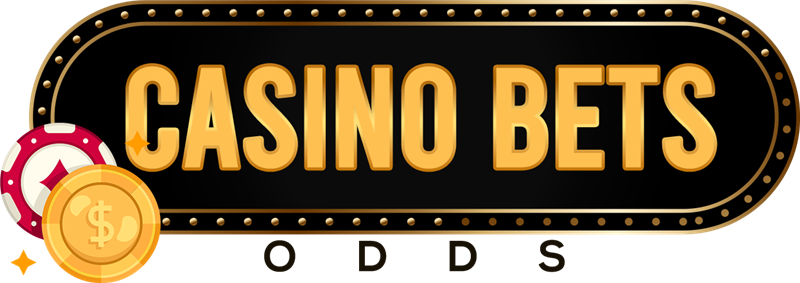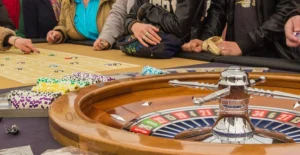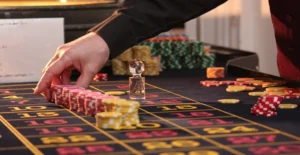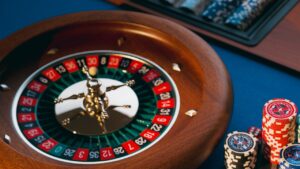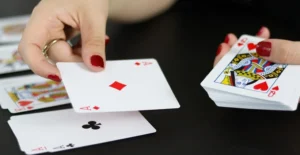Everyone wants to know what the most successful roulette strategy is. It’s a common question, actually. People are always looking for that one trick to beat the casino. But here’s the thing: roulette is a game of chance, plain and simple. While some strategies might seem clever, they don’t change the basic maths of the game. Let’s dig into why that is and what you should really focus on when playing.
Key Takeaways
- Roulette is a game of chance, so no strategy can guarantee a win.
- The house always has an edge, meaning the casino has a built-in advantage.
- Popular strategies like Martingale or Fibonacci don’t remove the risk of losing.
- Understanding probability is more helpful than relying on betting systems.
- Always gamble responsibly and set limits for yourself.
Understanding Roulette Basics
How Roulette Works
Roulette, at its core, is a pretty simple game of chance. A wheel with numbered slots spins, and a ball is dropped onto it. Where the ball lands determines the winning number and colour. The aim is to predict correctly which slot the ball will land in. There are different versions of roulette, mainly European and American, and the key difference is that the American version has an extra ’00’ slot, which affects the odds. It’s good to know that the top casino table games can be quite different.
- The dealer (or croupier) spins the wheel in one direction and releases the ball in the opposite direction.
- Players place their bets on the table layout, which corresponds to the numbers on the wheel.
- Once the ball comes to rest, the winning number is announced, and payouts are made to those who bet correctly.
Understanding the basic mechanics is the first step to exploring any potential strategies. It’s all about predicting where that little ball will end up.
Types of Roulette Bets
There’s a whole range of bets you can make in roulette, each with different odds and payouts. These bets are generally divided into ‘inside’ and ‘outside’ bets. Inside bets are placed on specific numbers or small groups of numbers, while outside bets cover larger groups, like red/black or odd/even. Understanding these different bets is key to developing any winning roulette techniques.
Here’s a quick rundown:
- Inside Bets:
- Straight Up: Bet on a single number.
- Split Bet: Bet on two adjacent numbers.
- Street Bet: Bet on a row of three numbers.
- Corner Bet: Bet on four numbers that form a square.
- Outside Bets:
- Red/Black: Bet on whether the winning number will be red or black.
- Odd/Even: Bet on whether the winning number will be odd or even.
- High/Low: Bet on whether the winning number will be in the high (19-36) or low (1-18) range.
- Column Bet: Bet on one of the three columns of numbers.
- Dozen Bet: Bet on one of the three dozens (1-12, 13-24, 25-36).
Knowing the different types of bets and their associated odds is crucial for anyone trying to find the best roulette betting system.
Popular Roulette Strategies and Their Flaws
Roulette is a game of chance, but that hasn’t stopped people from trying to find a roulette strategy that works. Many strategies have emerged over the years, each with its own set of rules and supposed advantages. However, it’s important to understand that no strategy can guarantee a win due to the inherent randomness of the game. Let’s look at some popular strategies and why they might not be as effective as some claim.
The Martingale Strategy
The Martingale is probably the most well-known roulette strategy. It involves doubling your bet after every loss, with the idea that when you eventually win, you’ll recover all your previous losses plus a small profit. Sounds great, right? The problem is that it requires a huge bankroll. A losing streak can quickly lead to very high stakes, potentially exceeding table limits or your own financial resources. Imagine starting with a £1 bet and losing six times in a row – your next bet would need to be £64 just to break even. This exponential increase makes it a risky strategy for anyone without deep pockets.
The Reverse Martingale Strategy
Also known as the Paroli strategy, the Reverse Martingale is the opposite of the classic Martingale. Instead of doubling your bet after a loss, you double it after a win. The idea is to maximise profits during winning streaks while minimising losses during losing streaks. While it can be less risky than the Martingale, as you’re only betting with winnings, it still relies on streaks occurring. If wins and losses alternate, you won’t see any significant gains, and you could end up losing your initial stake. It’s a less aggressive approach, but not a proven roulette strategy.
The D’Alembert Strategy
The D’Alembert strategy is a more conservative approach than the Martingale. Instead of doubling your bet after a loss, you increase it by a fixed amount (e.g., £1). After a win, you decrease your bet by the same amount. The theory is that wins and losses will eventually even out. However, this strategy can be slow to recover losses, especially if you experience a longer losing streak than a winning streak. It’s less risky than the Martingale, but also less likely to produce significant profits. It’s a slow and steady approach, but not necessarily the most effective roulette system.
The Fibonacci Strategy
The Fibonacci strategy uses the Fibonacci sequence (1, 1, 2, 3, 5, 8, 13, etc.) to determine the size of your bets. After a loss, you move to the next number in the sequence to determine your next bet. After a win, you move back two numbers in the sequence. This strategy is less aggressive than the Martingale but more aggressive than the D’Alembert. It aims to capitalise on winning streaks while mitigating losses. However, like all roulette strategies, it doesn’t eliminate the house edge and can still lead to losses if you encounter a prolonged losing streak.
It’s important to remember that all these strategies are based on mathematical principles, but they don’t change the underlying odds of the game. Roulette is still a game of chance, and the house always has an edge. These strategies can help manage your bankroll and potentially extend your playing time, but they can’t guarantee a win.
Why No Roulette Strategy Guarantees Success
The House Edge Explained
Roulette, at its core, is designed to favour the casino. This advantage is known as the house edge. It’s a percentage that represents the average profit the casino expects to make from each bet placed by players over the long run. The house edge exists because of the presence of the ‘0’ (and ’00’ in American roulette) on the wheel. These numbers aren’t covered by the even-money bets (red/black, odd/even, high/low), giving the casino a built-in advantage. For example, European roulette has a house edge of approximately 2.7%, while American roulette’s is around 5.26% due to the additional ’00’.
No matter which strategy you employ, the house edge remains constant. Strategies can alter the way you bet, but they cannot eliminate the fundamental mathematical advantage held by the casino. It’s a bit like trying to outrun the tide; you might delay the inevitable, but you can’t change the ocean.
Randomness and Probability
Roulette is a game of chance, and each spin of the wheel is an independent event. This means that past outcomes have absolutely no influence on future results. If the ball has landed on red ten times in a row, the odds of it landing on red again on the next spin are still nearly 50% (slightly less due to the ‘0’).
- Each spin is random.
- Past results don’t predict future outcomes.
- Probability dictates long-term averages, not short-term guarantees.
While strategies like the Martingale or Fibonacci might seem logical, they don’t alter the underlying probabilities. They simply change the way you manage your bets. Understanding risk management in roulette is key. The randomness of the wheel and the house edge mean that, over time, the casino is statistically likely to come out ahead. It’s important to remember that roulette is entertainment, not a guaranteed income source. The maths models used in different roulette games ensure the house always has an edge.
Responsible Gambling and Managing Expectations

It’s easy to get caught up in the excitement of roulette, especially when you’re trying out different strategies. However, it’s really important to keep a level head and gamble responsibly. Remember, roulette is ultimately a game of chance, and no strategy can guarantee a win. Let’s look at some key aspects of responsible gambling.
The House Edge Explained
Roulette, like all casino games, has a house edge. This means that over the long run, the casino is statistically more likely to win than the player. The house edge varies depending on the type of roulette you’re playing. For example, American roulette has a higher house edge (around 5.26%) compared to European roulette (around 2.7%) because of the extra ’00’ slot. Understanding the house edge is crucial for managing your expectations. It’s a reminder that the odds are always slightly stacked against you.
Randomness and Probability
Each spin of the roulette wheel is an independent event. This means that the outcome of one spin does not influence the outcome of the next. Even if the ball has landed on red ten times in a row, the odds of it landing on red again are still roughly the same. This randomness is what makes roulette so unpredictable. While strategies can help you manage your bets, they can’t change the underlying probability of the game. Don’t fall into the trap of thinking that past results can predict future outcomes. It’s all about probability in roulette.
It’s vital to set limits for yourself before you start playing. Decide how much money you’re willing to spend and stick to that budget. Similarly, set a time limit for your gambling session. Once you’ve reached either your financial or time limit, stop playing, regardless of whether you’re winning or losing.
Here are some tips for responsible gambling:
- Set a budget before you start playing and stick to it.
- Never gamble with money you can’t afford to lose.
- Take regular breaks to avoid getting carried away.
- Avoid chasing losses – it’s a surefire way to lose even more money.
- Recognise the signs of problem gambling and seek help if needed.
Frequently Asked Questions
How does the game of roulette actually work?
Roulette is a game of chance where you bet on where a small ball will land on a spinning wheel. The wheel has numbered and coloured pockets. You place your chips on a betting mat, choosing numbers, colours, or groups of numbers. Once all bets are placed, the dealer spins the wheel and drops the ball. If the ball lands in a pocket that matches your bet, you win!
Can any roulette strategy truly guarantee I’ll win?
No, not really. While some strategies might seem clever, roulette is mostly about luck. The casino always has a small advantage, called the ‘house edge’, which means that over a long time, the casino will always win a bit more than the players. So, no strategy can guarantee you’ll win every time.
What exactly is the ‘house edge’ in roulette?
The ‘house edge’ is the casino’s built-in advantage. It’s a small percentage that ensures the casino makes money over time. For example, in European roulette, there’s a single zero pocket. If you bet on red or black, and the ball lands on zero, you lose. That zero is part of the house edge, tipping the odds slightly in the casino’s favour.
Could you explain the Martingale strategy simply?
The Martingale strategy involves doubling your bet after every loss. The idea is that when you eventually win, you’ll get back all your lost money plus a small profit. However, this can be risky because you might hit the table’s betting limit, or you could run out of money before you win.
What does ‘responsible gambling’ mean when playing roulette?
It’s super important to gamble responsibly. This means setting a limit on how much money you’re willing to spend before you start playing, and sticking to it. Don’t chase your losses by betting more than you planned. Remember, roulette is for fun, not a way to make money. If you feel like you’re losing control, it’s best to stop.
How can understanding strategies help me if they don’t guarantee a win?
While no strategy guarantees a win, understanding how different bets work and how the game’s odds are set can help you make smarter choices. For example, betting on red/black or odd/even gives you almost a 50% chance of winning, even though the payout is lower. Knowing these things can make your playing experience more enjoyable.
Daniel Chase is a seasoned casino analyst and iGaming writer with over 10 years of experience in the online gambling industry. He specializes in game strategy, casino odds, and player-focused reviews. Daniel is passionate about helping players make smarter decisions through transparency, real data, and honest insight.
